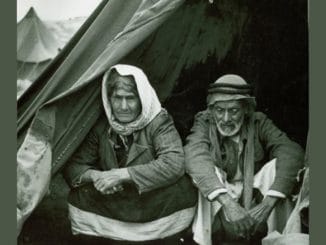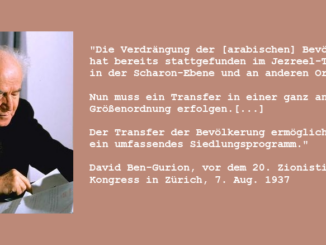Die israelische Geschichtsschreibung erreichte bis in die späten Achtziger Jahre eine ihr gefällige Lesart des ersten arabisch-israelischen Krieges.
In der Kurzfassung lautete sie: Nach der israelischen Unabhängigkeitserklärung wurde das junge Land von den arabischen Nachbarstaaten angegriffen und konnte sich überaus erfolgreich zur Wehr setzen.
Die arabisch-palästinensische Zivilbevölkerung floh aus eigenen Stücken in die Nachbarländer oder weil sie von ihren Führern dazu aufgefordert wurde. Nur in ganz wenigen Fällen kam es zur Gewaltanwendung.
Eine junge Generation von israelischen Historikern hat dieses Bild gründlich auf den Kopf gestellt und unter umfänglicher Verwertung israelischer Archivmaterialien nachgewiesen, dass die Vertreibung der Zivilbevölkerung vorsätzlich und höchst gewalttätig vonstatten ging.
Benny Morris als einer der ersten, die hierzu Forschungen vorlegten, hat nun ein weiteres werk zum Krieg von 1948 verfasst. Darin wird vor allem die forcierte Auflösung der palästinensischen Strukturen beschrieben, noch bevor es zum “offiziellen” Krieg nach der Unabhängigkeitserklärung kam. Der britische Historiker Avi Shlaim verfasste für den GUARDIAN eine Rezension, die mit einem Rückblick auf die “alte Version” beginnt:
1948 was a seismic year in the history of the Jewish people and that of the modern Middle East.
It witnessed the birth of Israel and its first war with the Arabs.
Israelis call it “the war of independence“; Arabs call it the nakba or the catastrophe. […]
The subsequent struggle was an unequal one between a Jewish David and an Arab Goliath. The infant Jewish state fought a desperate, heroic and ultimately successful battle for survival against overwhelming odds.
During the war, hundreds of thousands of Palestinians fled to the neighbouring Arab states, of their own accord or in response to orders from their leaders.
Shlaim geht kurz auf das erste Buch von Morris ein:
Benny Morris was a leading member of the group [of young israeli historians]. He had impeccable left-wing credentials as a kibbutznik, as a journalist and as an IDF reservist who spent three weeks in jail for refusing to serve on the West Bank during the first intifada. His book The Birth of the Palestinian Refugee Problem, 1947-1949 was a milestone in scholarship on this acutely sensitive subject. He concluded that, while there was no masterplan for expulsion, the IDF played a significant part in precipitating the flight of more than 700,000 Palestinians from Palestine. […]
… um sodann die Erkenntnisse des aktuellen Buches “1949: Eine Geschichte des ersten israelisch-arabischen Krieges” herauszustreichen:
The account proceeds chronologically, dividing the conflict into two distinct phases: the civil war and the inter-state war.
The first phase lasted from the day after the UN vote in favour of partition to the expiry of the British mandate over Palestine and the proclamation of the state of Israel on May 14 1948.
The second phase began with the pan-Arab invasion of Palestine on May 15 and lasted, with two UN-decreed truces in between, until the ceasefire of January 7 1949.
The first phase was between the two local communities; the second was between the army of the newly born state and the regular armies of all the neighbouring Arab states.
Most accounts of the war concentrate on the second phase, but the early one was more critical. During the first five months of fighting, the irregular Palestinian forces were crushed, Palestinian society was pulverised, and the first wave of refugees was set in motion.
Zitat Morris: “the Jews committed far more atrocities than the Arabs and killed far more civilians and PoWs in deliberate acts of brutality in the course of 1948.”
A contemporary Israeli official implicitly conceded the charge but pointed out that “There are no sentiments in war.”
Der israelische Gesandte in Deutschland, Ilan Mor, wäre gut beraten, sich einige der aktuellen historischen Werke seiner Landsleute zusammenfassen zu lassen und davon Abstand zu nehmen, die überholten alten Mythen zu verbreiten.
— Schlesinger
Mehr zur Nakba hier (Der israelische Gesandte Ilan Mor betreibt Geschichtsklitterung) oder hier.



